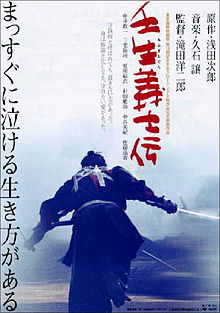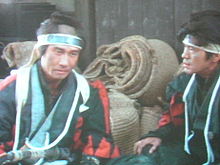- When the Last Sword Is Drawn
-
When the Last Sword Is Drawn 
Theatrical poster for When the Last Sword Is Drawn (2003)Directed by Yōjirō Takita[1] Produced by Nozomu Enoki
Hideji MiyajimaWritten by Jiro Asada (story)
Takehiro NakajimaStarring Kiichi Nakai
Koichi Sato
Yui Natsukawa
Takehiro MurataMusic by Joe Hisaishi Cinematography Takeshi Hamada Editing by Nobuko Tomita Distributed by Shochiku Release date(s) 2003 Running time 137 min. Country Japan Language Japanese When the Last Sword Is Drawn (壬生義士伝 Mibu Gishi Den) is a 2003 Japanese movie directed by Yōjirō Takita loosely based on real historical events. When the Last Sword Is Drawn won the Best Film award at the 2004 Japanese Academy Awards, as well as the prizes for Best Actor (Kiichi Nakai) and Best Supporting Actor (Koichi Sato). It received a further eight nominations.[2]
Contents
Synopsis
The film tells the story of two Shinsengumi samurai. One of them is Saitō Hajime (played by Koichi Sato), a heartless killer and the other is Yoshimura Kanichiro (played by Kiichi Nakai), who appears to be a money-grubbing and emotional swordsman from the northern area known as Nambu Morioka. The main storyline is set during the fall of the Tokugawa shogunate, but it is told in a series of flashbacks as two characters reminisce. The themes include conflicting loyalty to the clan, lord, and family.
More than just a story of swordplay, it is the story of a man willing to do anything for the good of his family, even if it means never being able to see them.
Cast
- Kiichi Nakai — Yoshimura Kanichiro
- Kōichi Satō — Saitō Hajime
- Yui Natsukawa — Shizu/Mitsu
- Takehiro Murata — Ono Chiaki
- Miki Nakatani — Nui
- Yuji Miyake — Ohno Jiroemon
- Eugene Nomura — Hijikata Toshizo
- Masato Sakai — Okita Soji
- Ito Atsushi — Young Chiaki Ono
References
- ^ Infobox data from "壬生義士伝" (in Japanese). Japanese Movie Database. http://www.jmdb.ne.jp/2003/ea000140.htm. Retrieved 2009-05-16. and Mibu gishi den (2003) at the Internet Movie Database
- ^ "Awards for Mibu gishi den (2003)" (in Japanese). Internet Movie Database. http://www.imdb.com/title/tt0359692/awards. Retrieved 2009-05-05.
External links
- Mibu gishi den (2003) at the Internet Movie Database
- Mibu gishiden at AllRovi
- "壬生義士伝" (in Japanese). Japanese Movie Database. http://www.jmdb.ne.jp/2003/ea000140.htm. Retrieved 2009-05-16.
- "MIBU GISHI DEN". Complete Index to World Film. http://www.citwf.com/film222871.htm. Retrieved 2009-05-16.
- "壬生義士伝" (in Japanese). www.walkerplus.com. http://www.walkerplus.com/movie/title/mo1628.html. Retrieved 2009-05-16.
- "壬生義士伝(2002)" (in Japanese). www.allcinema.net. http://www.allcinema.net/prog/show_c.php?num_c=239937. Retrieved 2009-05-08.
- "壬生義士伝" (in Japanese). Variety Japan. http://search.varietyjapan.com/moviedb/cinema_39432.html. Retrieved 2009-05-16.
Films directed by Yōjirō Takita Comic Magazine (1986) · Time Adventure: Zeccho 5-byo Mae (1986) · Itoshino Half Moon (1987) · Kimurake no Hitobito (1988) · Nemuranai Machi: Shinjuku Same (1993) · We Are Not Alone (1993) · Himitsu (1999) · Onmyoji (2001) · Onmyoji 2 (2003) · When the Last Sword Is Drawn (2003) · Ashurajō no Hitomi (2005) · The Battery (2007) · Departures (2008)
Japan Academy Prize for Best Film The Yellow Handkerchief (1978) · The Incident (1979) · Vengeance Is Mine (1980) · Zigeunerweisen (1981) · Station (1982) · Fall Guy (1983) · The Ballad of Narayama (1984) · The Funeral (1985) · Gray Sunset (1986) · House on Fire (1987) · A Taxing Woman (1988) · The Silk Road (1989) · Black Rain (1990) · Childhood Days (1991) · My Sons (1992) · Sumo Do, Sumo Don't (1993) · A Class to Remember (1994) · Crest of Betrayal (1995) · A Last Note (1996) · Shall We Dance? (1997) · Princess Mononoke (1998) · Begging for Love (1999) · Poppoya (2000) · After the Rain (2001) · Spirited Away (2002) · The Twilight Samurai (2003) · When the Last Sword Is Drawn (2004) · Half a Confession (2005) · Always Sanchōme no Yūhi (2006) · Hula Girls (2007) · Tokyo Tower: Mom and Me, and Sometimes Dad (2008) · Departures (2009) · Shizumanu Taiyō (2010) · Confessions (2011)
Cinema of Japan Actors · Awards · Directors (list) · Cinematographers · Composers · Editors · Festivals · Producers · Screenwriters Genres Gendai-geki · Jidaigeki · Pink film · Samurai cinema · Shomin-geki · Tendency film · Yakuza film (Gokudō)Films
 3-D films · Silent films · Short films · Television films · Films by directorFilms by genreAction · Anime · Comedy · Documentary · Drama · Horror · Jidaigeki · Mystery · Pink · Romance · Science fiction · Tokusatsu · Yakuza1898–1919 · 1920s · 1930s · 1940s · 1950 · 1951 · 1952 · 1953 · 1954 · 1955 · 1956 · 1957 · 1958 · 1959 · 1960 · 1961 · 1962 · 1963 · 1964 · 1965 · 1966 · 1967 · 1968 · 1969 · 1970 · 1971 · 1972 · 1973 · 1974 · 1975 · 1976 · 1977 · 1978 · 1979 · 1980 · 1981 · 1982 · 1983 · 1984 · 1985 · 1986 · 1987 · 1988 · 1989 · 1990 · 1991 · 1992 · 1993 · 1994 · 1995 · 1996 · 1997 · 1998 · 1999 · 2000 · 2001 · 2002 · 2003 · 2004 · 2005 · 2006 · 2007 · 2008 · 2009 · 2010 · 2011 · 2012
3-D films · Silent films · Short films · Television films · Films by directorFilms by genreAction · Anime · Comedy · Documentary · Drama · Horror · Jidaigeki · Mystery · Pink · Romance · Science fiction · Tokusatsu · Yakuza1898–1919 · 1920s · 1930s · 1940s · 1950 · 1951 · 1952 · 1953 · 1954 · 1955 · 1956 · 1957 · 1958 · 1959 · 1960 · 1961 · 1962 · 1963 · 1964 · 1965 · 1966 · 1967 · 1968 · 1969 · 1970 · 1971 · 1972 · 1973 · 1974 · 1975 · 1976 · 1977 · 1978 · 1979 · 1980 · 1981 · 1982 · 1983 · 1984 · 1985 · 1986 · 1987 · 1988 · 1989 · 1990 · 1991 · 1992 · 1993 · 1994 · 1995 · 1996 · 1997 · 1998 · 1999 · 2000 · 2001 · 2002 · 2003 · 2004 · 2005 · 2006 · 2007 · 2008 · 2009 · 2010 · 2011 · 2012Other Categories:- 2003 films
- Japanese films
- Samurai films
- Films directed by Yōjirō Takita
- Shochiku films
- 2000s Japanese film stubs
Wikimedia Foundation. 2010.

